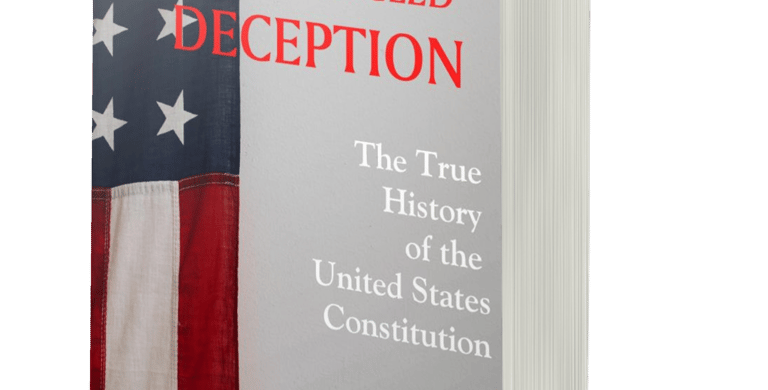
We Didn't Consent To The Constitution
The foundation of lawful government is by consent
Patrick Henry was a staunch anti-federalist who objected to the new Constitution on several grounds. One was that the Constitution contained many fatal flaws. Another was it did not authorize punishment for politicians guilty of malfeasance, maladministration, or who simply ignore the limitations of federal power.
In fact, Patrick Henry, one of the greatest early-American patriots, refused to have anything to do with the new federal government. He saw it as the prescription for tyranny. Lo and behold what we have today under the Biden regime. They do whatever they want without any repercussions.
The reason they get away with it is because they have swarms of federal agents and courts to keep them in power and tax us into poverty. And to stay in power they must get everyone's guns while arming the IRS to the hilt.
Meanwhile, Americans are busy waving their flags and attending MAGA rallies while their faces are being dutifully stored in FBI and NSA computers as "threats" to democracy. As if we had a democracy, or the founders wanted one.
But the government's power comes from something more powerful than the barrel of a gun. It comes from acquiesence. In other words, their real power comes from the unfounded belief that the federal government has any lawful authority over anyone. As I and others have pointed out, the Constitution was adopted under fraudulent pretenses for the benefit of a few politicians, landowners, and their henchmen. Thomas Jefferson, imperfect though he was, said the only lawful government is one that rules by consent of the people. It means voluntary consent, not consent or be shot.
In my view, tyranny will continue to get worse as long as Americans hold onto the myth that the Constitution obligates them to obey despots in the name of a fictitious democracy. If the Constitution were strictly followed, then we might have hope. But it is nothing more than a musty document now, a curtain behind which tyrants like Joe Biden and other political prostitutes claim lawful authority.
Sniffy Joe, in his demented state, believes HE is the government and anyone who disagrees with his policies is a terrorist threat. He says F-15 fighter jets will be used against Americans who disagree with his communist dictatorship. This is how far things have gotten out of hand with a defective Constitution.
Let's look at another patriot named Lysander Spooner (1808-1887), who rejected the authority of the Constitution to enslave us all. The following is reprinted with permission of the Mises Institute under a Creative Commons license:
Lysander Spooner (1808–1887) is the American individualist anarchist and legal theorist known mainly for setting up a commercial post office in competition with the government and thereby being shut down. But he was also the author of some of the most radical political and economic writings of the 19th century and continues to have a huge influence on libertarian thinkers today. He was a dedicated opponent of slavery in all its forms — even advocating guerrilla war to stop it — but also a dedicated opponent of the federal invasion of the South and its postwar reconstruction. Here is one of Spooner's writings:
"The number who actually consented to the Constitution of the United States, at the first, was very small. Considered as the act of the whole people, the adoption of the Constitution was the merest farce and imposture, binding upon nobody. The women, children, and blacks, of course, were not asked to give their consent. In addition to this, there were, in nearly or quite all the States, property qualifications that excluded probably one half, two thirds, or perhaps even three fourths, of the white male adults from the right of suffrage. And of those who were allowed that right, we know not how many exercised it.
Furthermore, those who originally agreed to the Constitution, could thereby bind nobody that should come after them. They could contract for nobody but themselves. They had no more natural right or power to make political contracts, binding upon succeeding generations, than they had to make marriage or business contracts binding upon them. Still further. Even those who actually voted for the adoption of the Constitution did not pledge their faith for any specific time; since no specific time was named, in the Constitution, during which the association should continue. It was, therefore, merely an association during pleasure; even as between the original parties to it.
Still less, if possible, has it been anything more than a merely voluntary association, during pleasure, between the succeeding generations, who have never gone through, as their fathers did, with so much even as any outward formality of adopting it, or of pledging their faith to support it. Such portions of them as pleased, and as the States permitted to vote, have only done enough, by voting and paying taxes, (and unlawfully and tyrannically extorting taxes from others,) to keep the government in operation for the time being.
And this, in the view of the Constitution, they have done voluntarily, and because it was for their interest, or pleasure, and not because they were under any pledge or obligation to do it. Any one man, or any number of men, have had a perfect right, at any time, to refuse his or their further support; and nobody could rightfully object to his or their withdrawal. There is no escape from these conclusions, if we say that the adoption of the Constitution was the act of the people, as individuals, and not of the States, as States.
On the other hand, if we say that the adoption was the act of the States, as States, it necessarily follows that they had the right to secede at pleasure, inasmuch as they engaged for no specific time. The consent, therefore, that has been given, whether by individuals, or by the States, has been, at most, only a consent for the time being; not an engagement for the future. In truth, in the case of individuals, their actual voting is not to be taken as proof of consent, even for the time being. On the contrary, it is to be considered that, without his consent having ever been asked, a man finds himself environed by a government that he cannot resist; a government that forces him to pay money, render service, and forego the exercise of many of his natural rights, under peril of weighty punishments.
He sees, too, that other men practice this tyranny over him by the use of the ballot. He sees further that, if he will but use the ballot himself, he has some chance of relieving himself from this tyranny of others, by subjecting them to his own. In short, he finds himself, without his consent, so situated that, if he uses the ballot, he may become a master; if he does not use it, he must become a slave. And he has no other alternative than these two. In self-defense, he attempts the former.
His case is analogous to that of a man who has been forced into battle, where he must either kill others, or be killed himself. Because, to save his own life in battle, a man attempts to take the lives of his opponents, it is not to be inferred that the battle is one of his own choosing. Neither in contests with the ballot—which is a mere substitute for a bullet—because, as his only chance of self-preservation, a man uses a ballot, is it to be inferred that the contest is one into which he voluntarily entered; that he voluntarily set up all his own natural rights, as a stake against those of others, to be lost or won by the mere power of numbers. On the contrary, it is to be considered that, in an exigency, into which he had been forced by others, and in which no other means of self-defense was offered, he, as a matter of necessity, used the only one that was left to him.
Doubtless the most miserable of men, under the most oppressive government in the world, if allowed the ballot, would use it, if they could see any chance of thereby ameliorating their condition. But it would not, therefore, be a legitimate inference that the government itself, that crushes them, was one which they had voluntarily set up, or ever consented to. Therefore a man’s voting under the Constitution of the United States is not to be taken as evidence that he ever freely assented to the Constitution, even for the time being. Consequently, we have no proof that any very large portion, even of the actual voters of the United States, ever really and voluntarily consented to the Constitution, even for the time being. Nor can we ever have such proof, until every man is left perfectly free to consent, or not, without thereby subjecting himself or his property to injury or trespass from others."
And so, Lysander Spooner laid out the case more succinctly than I could ever do. It sums up everything wrong with the fraudulent Constitution that Patrick Henry rejected. It doesn't mean we toss out the baby with the bath water, it means the Constitution is in need of drastic reforms by putting severe punishments in place for those dastardly politicians, judges, and prosecutors who ignore its strictures.
Until we have a Constitution that imposes severe punishment on the criminals in Washington, DC, all the rallies in the world aren't going to change the revolving door of election hustling and broken promises. Help spread the word by sharing the link to this blog.
To read more about how we were swindled out of lawful government, check out my book, The Star-Spangled Deception. Or, a donation in whatever amount will help. Go to Patreon, Paypal, or Ko-fi.


